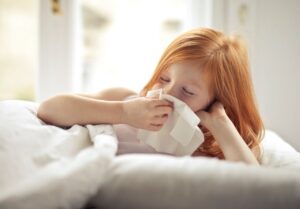The suffering allergic rhinitis brings to children is evident. Seeing a child's eyes swollen, their nose rough from frequent wiping, undoubtedly causes anguish for mothers. But there's no need to panic. When faced with allergic rhinitis, we just need to follow a few simple steps.
The first is the diagnostic stage. If you suspect your child has allergic rhinitis, take them to the hospital promptly, describe the child's symptoms to a pediatrician, and the doctor will make a professional diagnosis. Sometimes, the doctor may also suggest blood or skin allergy tests to identify allergens.
The second step is treatment. Typically, doctors prescribe oral antihistamines (mostly over-the-counter) to relieve itching, runny nose, sneezing, and other symptoms. However, traditional antihistamines may have some side effects, such as drowsiness, constipation, dry mouth, and occasionally, they may make the child anxious or behave abnormally. But now, there are some improved new-generation antihistamines on the market, such as loratadine and cetirizine, which may cause mild fatigue upon initial use, but the fatigue tends to diminish with regular use.
For more severe or persistent allergic rhinitis, doctors may prescribe corticosteroid nasal sprays, usually used once daily, to prevent allergic rhinitis attacks. If the child's eyes are red and itchy, the doctor may also prescribe some antiallergic eye drops to relieve eye allergy symptoms.
The third step is preventing recurrence. The most effective way to avoid the troubles of allergic rhinitis is to control allergens because allergic rhinitis is caused by inhalant allergens, so environmental control is also crucial.
For outdoor allergens, try to stay indoors when pollen is high, close windows, and use air conditioning. Especially during midday and early evening when pollen levels are highest, try to avoid going outside. After outdoor activities, wash hands, take a shower, and change clothes promptly. Additionally, avoid going to grassy areas and mowed lawns. If going outdoors is necessary, wearing a mask can effectively filter dust and pollen from the air, reducing exposure to allergens.
For indoor allergens, if allergic to animal fur, avoid keeping pets. Urine from some animals (like hamsters) can also trigger allergic rhinitis. Replace bedding that may cause allergies, such as pillows and comforters containing animal fur. Control indoor humidity to inhibit mold and dust mite growth, avoid frequent use of humidifiers. Air pillows and comforters regularly, change bedsheets weekly, and consider covering mattresses, pillows, and quilts with anti-dust mite covers. Wash them with water above 55℃ to eliminate dust mites. Additionally, it's recommended to avoid using carpets as they easily accumulate dust mites, and finally, create a smoke-free environment.
Children with allergic rhinitis need to pay special attention to good lifestyle habits, including regular routines and sufficient sleep. Maintaining a normal circadian rhythm can help stabilize the immune system and reduce the occurrence of allergic reactions.
Moreover, a balanced diet is crucial. Consuming plenty of fresh fruits, vegetables, and protein-rich foods helps maintain nutritional balance, boosts immunity, and reduces the incidence of colds and allergies.
For children, taking some measures before going out in the early winter mornings can alleviate nasal mucosal irritation. For example, using a warm towel to cover their faces after waking up gradually helps them adjust to the warm indoor environment, reducing sensitivity to cold air.
Finally, moderate exercise is also beneficial for boosting immunity and improving nasal blood circulation. Children can choose suitable exercises such as jogging, swimming, or skipping rope, and sticking to a certain amount of exercise every day helps alleviate the symptoms of allergic rhinitis.
Although allergic rhinitis causes some trouble for children and parents, through timely diagnosis, effective treatment, and preventive measures, we can manage this issue effectively. Let's stay optimistic and believe that under the guidance of doctors, children's symptoms will be relieved, and they will be able to enjoy a healthy and happy life again.
References: AAP, HealthyChildren, 《Dr. Huang Zining accompanies you to raise healthy children》











